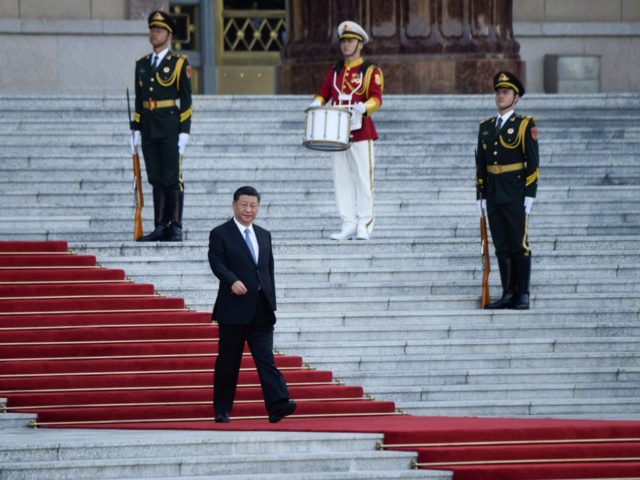Hong Kong pro-democracy activist Joshua Wong, arrested twice in the past two weeks for his advocacy for freedom and self-determination, issued a call in Germany on Monday for the world to unite not just with the protest movement in his city, but against “emperor” Xi Jinping.
The Chinese dictator has said little about the three-month-old movement in Hong Kong demanding that China stop violating the “One Country, Two Systems” policy that bans communism from the autonomous region. The protesters, on their part, have also not spent too much time directly challenging Xi, instead confronting Hong Kong Chief Executive Carrie Lam and other city officials who refuse to listen to the protesters’ plea for democracy.
Wong, the secretary-general of the Demosisto pro-freedom group, was arrested shortly before leaving Hong Kong for a tour of Germany and the United States, but released shortly thereafter as police had used a technical error on his bail provisions to enact the arrests.
He was also arrested last week on charges of inciting violence for challenging the Chinese communist regime and its puppets in the Hong Kong government.
At an event hosted by the German newspaper Bild, Wong declared his city “the new Berlin” in the Cold War between China and the free world.
“‘Stand with Hong Kong’ is much more than just a mere slogan, we urge the free world to stand together with us in resisting the autocratic Chinese regime,” he said, promising to “protest until the day that we have free elections.”
Wong clarified that Xi Jinping was “not a president, but an emperor.”
Xi Jinping’s most powerful title is as the head of the Communist Party of China. He holds many other titles, including the “president of China” and commander-in-chief of the People’s Liberation Army (PLA). While many in the West address him as “president,” that office in China merely gives him power over the legislature and does not have the powers typically attributed to Western presidents.
Wong is scheduled to meet with German lawmakers and has already held a meeting with German Foreign Minister Heiko Maas, which he shared on his Twitter account.
The Communist Party of China, which considers Wong a dangerous separatist for his views on human rights and individual freedom, called the foreign minister’s meeting with the activist “disrespectful” and “extremely wrong.”
“I want to stress once again that Hong Kong affairs are purely China’s internal affairs. No foreign government, organisation or individual has the right to intervene,” Chinese Foreign Ministry spokeswoman Hua Chunying told reporters on Tuesday. “It is extremely wrong for German media and politicians to attempt to tap into the anti-China separatist wave. … It is disrespectful of China’s sovereignty and an interference in China’s internal affairs.”
Reacting on Twitter, Wong called Hua’s remarks “baffling.”
“I notice[d] earlier on China also exert pressure on Portuguese government … this tactic won’t make China look powerful,” he observed.
Wong spent a month in prison, released in mid-June, for his participating in the 2014 Umbrella movement urging democracy in Hong Kong when he was 17 years old. Upon his release, the activist promised to join what was at the time a nascent protest movement that has snowballed into a call by millions for free and fair elections in the city, as well as other civil liberties.
Wong continued joining protests for two months before being arrested again in August. Rather than being arrested by traditionally uniformed officers in an open manner, plain-clothes officers reportedly whisked Wong into an unmarked van off of the street a week ago. He resurfaced at the nearest police station, charged with inciting riots. Wong was among at least eight other activists arrested on August 30.
Upon his release, Wong traveled to Taiwan for scheduled speaking engagements urging the Taiwanese to support Hong Kong’s battle for freedom against China. When he returned to Hong Kong, police immediately arrested him, despite the court stating that he was allowed to travel to places he had scheduled visits to before his arrest. The court ultimately found that, while a judge told Wong that he was free to travel orally, his bail documents did not reflect that.
Wong addressing Xi Jinping directly as the tyrant responsible for the protests highlights Xi’s relative silence on the matter. He has only mentioned Hong Kong once in public statements since the protest movement began in June, and only in passing as one of several “challenges” facing Chinese communists. The solution to these “challenges,” he said, was “strict ideological, political and practical training.”
Xi has not responded to President Donald Trump’s recommendation last month that he meet with the Hong Kong protests’ most prominent activists personally to come to a “happy and enlightened ending to the Hong Kong problem.”
The Hong Kong protest movement has issued five demands of its government: the full withdrawal of a bill that would have allowed China to extradite people present in Hong Kong, freedom for political prisoners, direct election of lawmakers, a correction from the government for calling peaceful protests “riots,” and an independent investigation into police brutality against protesters.
Hong Kong Chief Executive Carrie Lam announced the withdrawal of the extradition bill last week.

COMMENTS
Please let us know if you're having issues with commenting.